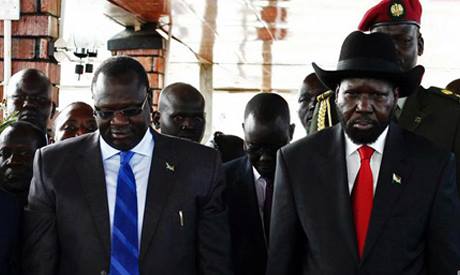South Sudan President Salva Kiir signed a deal Wednesday to end 20 months of war in the world’s youngest nation, but added a list of reservations that raised doubts about whether peace would take hold.
 South Sudan President Salva Kiir signed a deal Wednesday to end 20 months of war in the world's youngest nation, but added a list of reservations that raised doubts about whether peace would take hold.
South Sudan President Salva Kiir signed a deal Wednesday to end 20 months of war in the world's youngest nation, but added a list of reservations that raised doubts about whether peace would take hold.
The signing ceremony was held in the capital Juba under the threat of UN sanctions if Kiir failed to put his name to the accord, which had already been signed by rebel leader Riek Machar.
At least seven ceasefires have already been agreed and then shattered within days - if not hours - in South Sudan, which broke away from Sudan in 2011.
"The current peace we are signing today has so many things we have to reject," Kiir said at the ceremony, attended by leaders of neighboring Kenya, Ethiopia and Uganda.
"Such reservations, if ignored, would not be in the interests of just and lasting peace."
The United States, the key supporter of South Sudan's statehood, welcomed the signing and said the peace deal should be implemented as it stands.
"We do not recognize any reservations or addendums to that agreement," said US National Security Advisor Susan Rice in a statement from Washington.
On the eve of the signing, the UN Security Council had ramped up the pressure on Kiir, threatening "immediate action" if he failed to sign or signed with reservations.
But the council on Wednesday gave Kiir until September 1 to get fully behind the peace deal as it weighed a possible arms embargo and targeted sanctions.
The United States last week presented a draft UN resolution on those punitive measures, which would go into effect on September 6.
"The deadline for (Kiir) is September 1," said Nigerian Ambassador to the UN Joy Ogwu, who chairs the council this month. "He has room to play."
Tens of thousands of people are estimated to have died in a war marked by ethnic killings and rape that have fueled one of the world's worst humanitarian crises.
The deal was brokered by the regional eight-nation IGAD bloc, along with the UN, the African Union, China, Britain, Norway and the United States.
The accord commits both sides to end fighting and implement a "permanent ceasefire" within 72 hours, but both the government and rebels accused each other of launching attacks against the other on Wednesday.